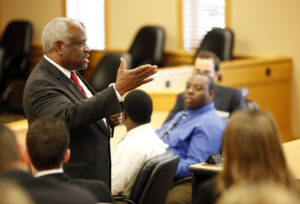Three columns based on the same case, Trump v. United States, about presidential immunity. (The link to each full column is embedded in each headline.)
Overview: Why near-total immunity is not warranted (April 26): Several Supreme Court justices yesterday seemed disturbingly open to far too wide a scope of supposed presidential immunity from criminal prosecution. Almost nothing in the actual text of the Constitution provides for such immunity.
At oral argument in Trump v. United States, Justice Clarence Thomas asked the right question of Trump’s attorney, John Sauer: “Could you be more precise as to the source of this immunity?” Sauer answered that the constitutional source is the clause in Article II that says, “The executive power shall be vested in a President of the United States.”
Thomas followed up: “And how does that happen?” Sauer’s answer was clever but weak….

Why Clarence Thomas is perfectly positioned to reject over-broad immunity (April 28): As the Supreme Court’s most renowned originalist-textualist member, Justice Clarence Thomas has a chance in the case of Trump v. United States to definitively refute the liberal media’s claim that the court is just another realm of tawdry politics….
Alito, Gorsuch, and Kavanaugh ask questions that sound liberal, not conservative (April 29): In last week’s Supreme Court oral arguments regarding former President Donald Trump’s assertion of “total immunity” for acts committed as president, conservative Justices Samuel Alito, Brett Kavanaugh, and Neil Gorsuch each considered questions outside the court’s proper purview.
Except perhaps at the very margins, they should not base their decisions on those questions or the answers thereto.
Alito worried that without immunity for former presidents, “there has to be a trial, and that may involve great expense and it may take up a lot of time, and during the trial, the former president may be unable to engage in other activities that the former president would want to engage in.”
Well, so what? First, this is true of any defendant. That’s the nature of being a defendant: It’s inconvenient, to say the least. Why should a former president be spared the bother? Second and more importantly, why is this even relevant? The issue at hand is not whether a president should, in a logical world, enjoy some form of immunity. The issue is whether a president does enjoy immunity based on anything in the Constitution….






